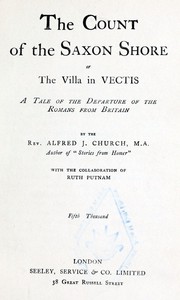The Count of the Saxon Shore; or The Villa in Vectis.<br />A Tale of the Departure of the Romans fro by Church and Putnam (fantasy books to read TXT) 📗

- Author: Church and Putnam
Book online «The Count of the Saxon Shore; or The Villa in Vectis.<br />A Tale of the Departure of the Romans fro by Church and Putnam (fantasy books to read TXT) 📗». Author Church and Putnam
The assembly broke up in great good-humour, and the newly-made Emperor, attended by the officers, went to take possession of headquarters.
A PRIZE.
It was a bright morning some three weeks after the occurrences related in the last chapter, when a squadron of four Roman galleys swept round the point which is now known as the South Foreland. The leader of the four, all of which, indeed, lay so close together as to be within easy hailing distance, bore on its mainmast the Labarum, or Imperial standard, showing on a ground of purple a cross, a crown, and the sacred initials, all wrought in gold. It was the flagship, so to speak, of the great Count himself, one of the most important lieutenants of the Empire, whose task it was to guard the shores of Britain and Northern Gaul from the pirate swarms that issued from the harbours of the North Sea and the Baltic. The Count himself was on board, coming south from his villa on the eastern shore—for the stations of which he had the charge extended as far as the Wash—to his winter residence in the sunny island of Vectis.
[pg 22]The Count was a tall man of middle age, and wore over his tunic a military cloak reaching to the hips, and clasped at the neck with a handsome device in gold, representing a hunting-dog with his teeth fixed in a stag. His head was covered with a broad-brimmed hat of felt. The only weapon that he carried was a short sword, which, with its plain hilt and leather scabbard, was evidently meant for use rather than show. His whole appearance and bearing, indeed, were those of a man of action and energy. His eyes were bright and piercing; his nose showed, strongly pronounced, the curve which has always been associated with the ability to command; the contour of his chin and lips, as far as could be seen through a short curling beard and moustache, worn as a prudent defence against the climate, betokened firmness. Still, the expression of the face was not unkindly. As a great writer says of one whom Britain had had good reason in earlier days both to fear and to love, “one would easily believe him to be a good man, and willingly believe him to be great.”
At the time when our story opens he was standing in conversation with the helmsman, a weather-beaten old sailor, whose dark Southern complexion had been deepened by the sun and winds of more than fifty years of service into an almost African hue.
“The wind will hardly serve us as well as it has,” said the Count, as his practised eye, familiar with [pg 23]every yard of the coast, perceived that they were well abreast of the extreme southern point of the coast.
“No, my lord,” said the old man, “we shall have to take as long a tack as we can to the south. There is a deal of west in the wind—more, I think, than there was an hour since. Castor and Pollux—I beg your lordship’s pardon, the blessed Saints—defend us from anything like a westerly gale.”
“Ah! old croaker,” replied the Count, with a laugh, “I verily believe that you will be half disappointed if we get to our journey’s end without some mishap.”
“Good words, good words, my lord,” said the old man, hastily crossing himself, while he muttered something, which, if it could have been overheard, would have been scarcely suitable to that act of devotion. “Heaven bring us safe to our journey’s end! Of course it is your lordship’s business to give orders, and ours to go to the bottom, if it is to be so. But I must say, saving your presence, that it is against all rules of a sailor’s craft as I have known it, man and boy, for nigh upon threescore years, to be at sea near about a month after the autumn equinox.
That is what my father used to say, and his fathers before him, for I do not know how many generations, for we have always followed the sea.”
“Very well for them, perhaps,” said the Count, “in the days when a man would almost as soon go into a lion’s den as venture out of sight of land. But the world is too busy to let us waste half our year on shore.”
“Yes, yes, I know all about that,” answered the old man, who was privileged to have the last word even with so great a personage as the Count; “but there is a proverb, ‘Much haste, little speed,’ and I have always found it quite as true by sea as by land.”
Meanwhile the proper signals had been given to the rest of the squadron, and the whole four were now heading south, with a point or two to the west, the Panther—for that





Comments (0)